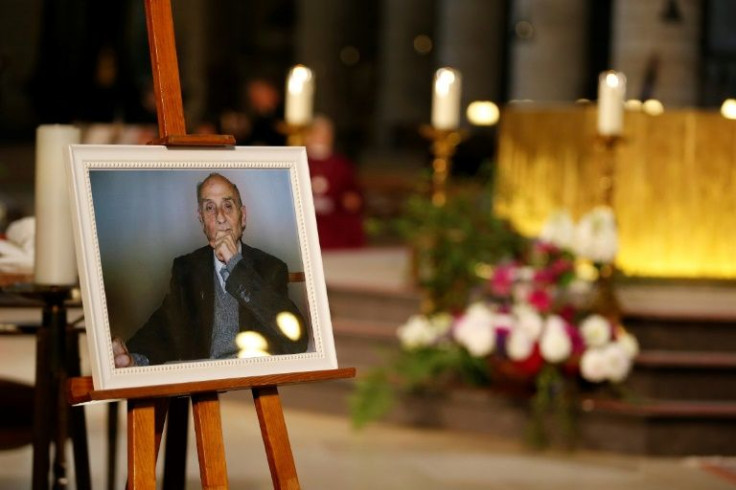Trial Opens Over Jihadist Murder Of French Priest
The alleged accomplices in the 2016 murder of an 85-year-old French priest appeared in the dock in Paris on Monday after years of investigation into an attack that shocked a country already reeling from a spate of jihadist assaults.
Father Jacques Hamel had his throat slit at the foot of the altar on July 26, 2016, at his small church in Saint-Etienne-du-Rouvray, a working-class suburb of Rouen in northwest France.
The two 19-year-old assailants, Adel Kermiche and Abdel-Malik Petitjean, also seriously injured a worshipper after bursting in during mass and taking hostages before being shot and killed by police as they tried to leave the church.
They claimed in a video to be members of the Islamic State group, which later called them its "soldiers" retaliating for France's fight against jihadists in Syria and Iraq.
Three men appeared in the Paris courtroom on charges of conspiracy with terrorists, with prosecutors saying they knew of the attackers' plan.
Hamel's murder came as the country was on high alert over a series of jihadist attacks that began with a massacre at the satirical newspaper Charlie Hebdo in January 2015, which have claimed more than 250 lives.
It also raised questions about the ability of French intelligence agencies to prevent such attacks, since Kermiche was wearing an electronic bracelet at the time after anti-terrorism police learned he had twice tried to go and fight in Syria.
"We want the truth on the lack of resources for public authorities to avoid my brother's massacre," said Roseline Hamel, one of the priest's sisters and a plaintiff in the case.
Lawyers have called for testimony from agents of the DRPP police intelligence agency, though some have refused, citing "psychological trauma" in the wake of Hamel's death.

The suspects -- Jean-Philippe Jean Louis, Farid Khelil and Yassine Sebaihia -- were all in contact with the assailants, with Jean Louis also travelling with Petitjean to Turkey just weeks before the attack in an attempt to reach Syria.
"You're trying to pin too much on me," Khelil, now 36, told the court. Like the two others he has denied the charges of conspiracy with terrorists, for which they face up to 30 years in prison if convicted.
While acknowledging that Petitjean encouraged him to begin praying and showed him propaganda videos to spur "awareness" of the sufferings of Syrians, Khelil, a longtime cannabis smoker, said he "never observed" Islamic practices.
The suspect, his long hair in a ponytail, also told the court that he had "a lot of trouble" remembering all the relevant facts.
A fourth suspect, Rachid Kassim, a Frenchman who became a key Islamic State recruiter and is the alleged instigator of the attack, has been charged with complicity in the killing by helping to choose the target and providing advice.
"Pounce on the infidels like a hungry lion pounces on its prey," Kassim told them in audio and social media conversations discovered by investigators.
But Kassim is believed to have been killed in 2017 during a coalition airstrike near Mosul, Iraq, where he lived, but is being tried in absentia since the death has not been confirmed.
Police also say Kassim was behind the chilling murder of a police officer and his companion in front of their three-year-old son in Magnanville, a Paris suburb, just a few weeks before Hamel's murder.
Despite the absence of the main culprits, Hamel's relatives and the victims are hoping to learn how the young men came to embrace the extremist ideology that led to the attack.
Guy Coponet, who was critically injured while being held hostage in the church, said he hoped for "justice to be done" for the young men on trial as well as for the victims.
© Copyright AFP {{Year}}. All rights reserved.





















